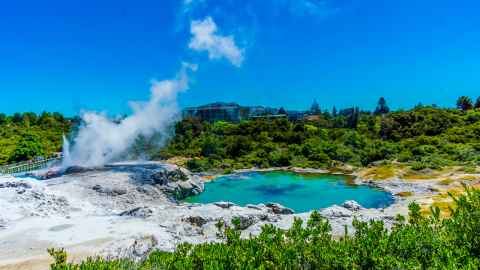Geothermal strategy can be catalyst for transformational change
31 July 2025
Opinion: The Government's draft geothermal strategy shows it sees the long-term opportunity of geothermal energy and is willing to put its weight behind it, says John O'Sullivan.

The launch of the Government’s draft geothermal strategy, ‘From the Ground Up – a draft strategy to unlock New Zealand’s geothermal potential’, a first for our country, is a watershed moment.
It signals that geothermal energy is no longer the quiet achiever in our energy system – the revived focus on its potential recognises that geothermal can be central to our national vision for a sustainable, resilient, and economically empowered future.
We have worked in the geothermal sector with engineers, scientists, Māori trusts, and industry leaders for decades, here and globally, and it’s clear his strategy is welcomed with enthusiasm and optimism. The direction is right. The language is ambitious. And the need is urgent.
At the Geothermal Institute at the University of Auckland, we see this as more than a policy milestone – it’s a long-awaited catalyst for transformational change. Hearing Ministers Shane Jones, Louise Upston and Shane Reti tell it, educating our young people and providing compelling career opportunities in geothermal needs to be at the heart of it.
The importance of signals
One of the most powerful aspects of the strategy is what it signals: that geothermal matters. That it has a future that can rival its storied past. That government sees the long-term opportunity and is willing to put its weight behind it.
That’s no small thing. As any developer or technology innovator will tell you, long-term certainty is the foundation of long-term investment. This strategy builds on tangible commitments already made – particularly in the Government’s investment to accelerate research-backed supercritical geothermal technology development. This technology aims to harness extremely high-temperature fluids from deep underground to generate renewable energy more efficiently than conventional geothermal technology. That backing will keep New Zealand at the forefront of technology to tap ultra-hot geothermal fluids to produce radically more energy per well.
This is complex science and engineering with high stakes and high rewards. If we get this right, we not only unlock more clean energy, but also more industrial process heat, more energy-dense sites, and more export opportunities for our solidified globally leading expertise.
The ripple effects for regional economic development are significant: the creation of highly skilled, highly paid jobs in engineering, geoscience, subsurface modelling, advanced manufacturing and programme and environmental management in regions including Taupō, Kawerau and Rotorua, from Northland to the Central Volcanic Plateau. The students at the Geothermal Institute will be the first to tell you: these are real jobs that future-proof careers and bolster local economies.
Building a globally competitive innovation pipeline requires sustained support ... to meet the Government’s ambition to double geothermal energy use by 2040 will require scaling up education and training.
From field to frontier
Geothermal is a mature sector, but it’s also a frontier sector. What struck me at the New Zealand Geothermal Week in Taupō this year wasn’t just the technical excellence on display, but the dynamism.
I had conversations with rangatahi curious about career pathways, with iwi-led developers eyeing up direct heat projects, with engineering consultants pitching AI-assisted reservoir models, and with international visitors in awe of the collaborative NZ Inc spirit in the room.
Future skills were a strong emerging theme throughout, where the message was loud and clear: the sector is hungry for talent, and young people are hungry for purpose. We need to meet them in the middle – with curriculum pathways, internship pipelines, scholarships targeting local communities and a long-term commitment to Stem education throughout the education value chain.
But building a globally competitive innovation pipeline requires sustained support. Training world-class geoscientists and engineers doesn’t happen overnight. It needs the right investment and long-term partnerships. And to meet the Government’s ambition to double geothermal energy use by 2040 will require scaling up education and training.
That’s why the strategy’s success will ultimately rest not only on the high-level vision of geothermal growth, but also what sits behind it to fuel that growth.
Reinforcing New Zealand’s global leadership
New Zealand already enjoys a stellar reputation in geothermal internationally. Our engineers and consultants are in demand in Southeast Asia, East Africa, North America, Latin America, the Pacific, Europe and beyond. Our training programmes and postgraduate education programmes have produced alumni who now lead geothermal policy development, regulation, production and scientific research on every continent.
This strategy, if paired with smart investment and coordinated delivery, could elevate that leadership to the next level.
We could be the first country to commercialise supercritical geothermal knowhow. We could be the global centre for geothermal workforce training, standards and certification. We could supercharge the export of integrated geothermal solutions, from power plant designs and drilling capability to stakeholder partnering frameworks, carbon capture innovations, critical minerals extraction, cutting-edge digital modelling and real-time assessment tools, and more.
This is the soft power of geothermal – and it’s rooted in decades of practical excellence, technical ingenuity, and manaakitanga.
A call to action
The Government’s draft Geothermal Strategy establishes a clear framework for the growth of geothermal. At the launch this week, ministers set a challenge for our geothermal community to turn it into a bold, coherent vision for the future.
The geothermal sector is ready – meeting challenges is what we do.
Dr John O'Sullivan is co-director of the Geothermal Institute, Faculty of Engineering and Design
This article reflects the opinion of the author and not necessarily the views of Waipapa Taumata Rau University of Auckland.
This article was first published on Newsroom, Geothermal strategy can be catalyst for transformational change, 31 July, 2025
Media contact
Margo White I Research communications editor
Mob 021 926 408
Email margo.white@auckland.ac.nz